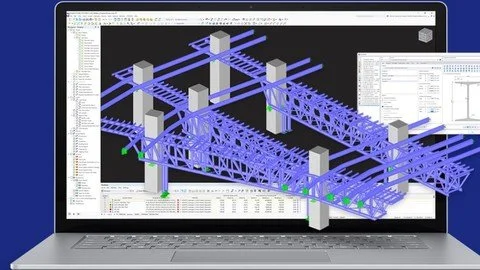Mastering Structural Steel Design With Rstab
Structural Steel Design, RSTAB, Eurocode 3, Base plates
What you'll learn
Design structural steel members using Dlubal RSTAB in ULS and SLS
Learn to design base plates and foundations after finishing steel design in Dlubal RSTAB
Master your structural analysis and design of steel structures
Deepen your knowledge and understanding EC3
Learn the most-used structural analysis software (RSTAB) in Europe and land a good job in Germany, Switzerland and Austria

Requirements
- Basic knowledge of structural engineering (vocational training or students of bachelor's degree)
- A computer that can run RSTAB
Description
The course 'Structural Steel Design Using Dlubal RSTAB' is desgined to help you a) model and carry out structural steel design using the Eurocode 3 using the general method and the equivalent member method b) design steel members under torsion using warping torsion add-onc) review your basics of structural analysis and design of steel membersd) Understand and learn from the common mistakes made by practicing engineers using the Dlubal RSTABe) Create a detailed printout report for a steel made structure designed in RSTABf) Learn modeling tips and tricks that help you save time when working in RSTABg) Carry out baseplate in Hilti and Autodesk Robot and foundation design using FRILO after finishing the design of structural steel h) Understand how the rigidity of steel connections affect your structural model using Eurocode 3i) See and learn in details how a piperack in an industrial plant is designed from A to Z in RSTABj) See and learn in details how 5-story steel frame is analysed and designed from A to Z in RSTABk) Receive assignments that cover the topics from basic to advanced ones in RSTABl) Learn how retrofitting measures work in structural steel design in RSTAB
Overview
Section 1: RSTAB Basics
Lecture 1 Introduction to RSTAB Software - User interface and mouse keys
Lecture 2 Setting up a new project - a steel girder in 2D - design codes & General Data
Lecture 3 Creating nodes, materials and cross sections
Lecture 4 Drawing members and defining supports
Lecture 5 Applying loads and running the analysis
Lecture 6 Displaying support reactions
Lecture 7 Displaying internal forces and deflections
Lecture 8 Designing the girder acc. to EC3 for LTB (Lateral toriosnal buckling)
Lecture 9 Designing the girder acc. to EC3 for bending and compression
Lecture 10 Setting up and creating the first printout report for documentation
This course has been designed to help a) undergraduate and graduate students of structural engineernig b) practicing engineers who have been doing steel design d) engineers who would like to work in Europe, particularly in Germany, Switzerland or Austria and d) anyone who would like to deepen their knowledge of structural steeldesign using the Dlubal RSTAB software.
Published 9/2024
MP4 | Video: h264, 1920x1080 | Audio: AAC, 44.1 KHz
Language: English | Size: 298 MB | Duration: 0h 33m
Download
http://s9.alxa.net/one/2024/09/Maste...with.RSTAB.rar
Structural Steel Design, RSTAB, Eurocode 3, Base plates
What you'll learn
Design structural steel members using Dlubal RSTAB in ULS and SLS
Learn to design base plates and foundations after finishing steel design in Dlubal RSTAB
Master your structural analysis and design of steel structures
Deepen your knowledge and understanding EC3
Learn the most-used structural analysis software (RSTAB) in Europe and land a good job in Germany, Switzerland and Austria

Requirements
- Basic knowledge of structural engineering (vocational training or students of bachelor's degree)
- A computer that can run RSTAB
Description
The course 'Structural Steel Design Using Dlubal RSTAB' is desgined to help you a) model and carry out structural steel design using the Eurocode 3 using the general method and the equivalent member method b) design steel members under torsion using warping torsion add-onc) review your basics of structural analysis and design of steel membersd) Understand and learn from the common mistakes made by practicing engineers using the Dlubal RSTABe) Create a detailed printout report for a steel made structure designed in RSTABf) Learn modeling tips and tricks that help you save time when working in RSTABg) Carry out baseplate in Hilti and Autodesk Robot and foundation design using FRILO after finishing the design of structural steel h) Understand how the rigidity of steel connections affect your structural model using Eurocode 3i) See and learn in details how a piperack in an industrial plant is designed from A to Z in RSTABj) See and learn in details how 5-story steel frame is analysed and designed from A to Z in RSTABk) Receive assignments that cover the topics from basic to advanced ones in RSTABl) Learn how retrofitting measures work in structural steel design in RSTAB
Overview
Section 1: RSTAB Basics
Lecture 1 Introduction to RSTAB Software - User interface and mouse keys
Lecture 2 Setting up a new project - a steel girder in 2D - design codes & General Data
Lecture 3 Creating nodes, materials and cross sections
Lecture 4 Drawing members and defining supports
Lecture 5 Applying loads and running the analysis
Lecture 6 Displaying support reactions
Lecture 7 Displaying internal forces and deflections
Lecture 8 Designing the girder acc. to EC3 for LTB (Lateral toriosnal buckling)
Lecture 9 Designing the girder acc. to EC3 for bending and compression
Lecture 10 Setting up and creating the first printout report for documentation
This course has been designed to help a) undergraduate and graduate students of structural engineernig b) practicing engineers who have been doing steel design d) engineers who would like to work in Europe, particularly in Germany, Switzerland or Austria and d) anyone who would like to deepen their knowledge of structural steeldesign using the Dlubal RSTAB software.
Published 9/2024
MP4 | Video: h264, 1920x1080 | Audio: AAC, 44.1 KHz
Language: English | Size: 298 MB | Duration: 0h 33m
Download
http://s9.alxa.net/one/2024/09/Maste...with.RSTAB.rar